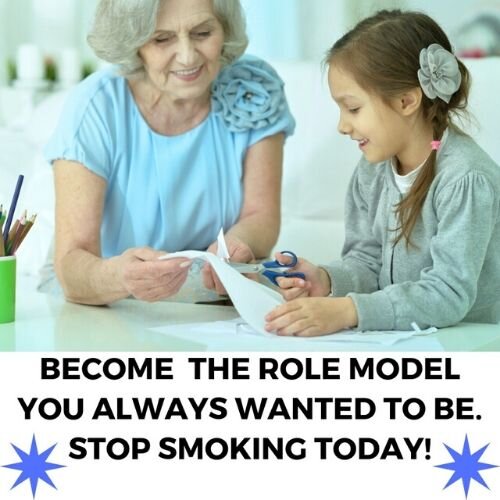This video is 6:16 minutes long
This video is 5:21 long
FREE SELF HYPNOSIS AUDIO PROGRAM
Are you interested in what it feels like to be hypnotized?
Get comfortable somewhere where you will not be disturbed for 30 minutes.
Put on headphones or earbuds and listen to The Stop Smoking Lady, Helena Jehnichen, Certified Clinical Hypnotherapist take you on an inner journey, to a place where total relaxation is possible and dreams are realized.
TOP TEN TIPS TO QUIT SMOKING
1. Decide to Stop Smoking – Make it all about YOU! When you decide something, it is actually easy to is your decision.
2. Benefits – What’s in it for me? List out what you will gain once you become a non smoker.
3. Change Your Words - From Need to Want. No one needs a cigarette. People want to smoke. No baby ever came out of the womb and said “Hey Mama, got a smoke?”
4. Change Hands - Smoke with the other hand.
5. Change Location - Smoke in a different spot.
6. Track When & Where - Keep a Journal – Time and Location. Is there a pattern?
7. Track Your Feelings/Emotions. Is there a pattern?
8. Switch it up - Buy a Different Brand of Cigarettes. Remind yourself of what cigarettes and smoking really tastes like.
9. Use Paper - Pay Cash for Cigarettes. Feel what it is like to have money slip through your hands and in exchange for poor health and poison.
10. Hire a Hypnotist — Choose someone who is a smoking cessation specialist.
Case Study & Reports
Please click here to view a case study that demonstrated the effectiveness of many different methods used by people to quit smoking.
The Mayo Clinic reports that studies show hypnotherapy may be used to:
o Change negative behaviors, such as smoking, bed-wetting and overeating
o Reduce or eliminate fears, stress and anxiety
o Treat pain during childbirth and reduce labor time
o Control pain during dental and surgical procedures
o Relieve symptoms associated with irritable bowel syndrome (IBS)
o Lower blood pressure
o Control nausea and vomiting caused by chemotherapy
o Reduce the intensity or frequency of headaches, including migraines
o Treat and ease the symptoms of asthma
o Hasten the healing of some skin diseases, including warts, psoriasis and atopic dermatitis mayoclinic.com
Hypnosis is the most effective way of giving up smoking according to the largest ever scientific comparison of ways of breaking the habit. Willpower, it turns out, counts for very little," concluded New Scientist, referring to a meta-analysis by Iowa University scientists. The researchers statistically combined results of 600 studies of almost 72,000 individuals who had successfully quit smoking using a variety of methods: hypnotherapy, aversion therapy, acupuncture, nicotine substitutes and willpower. Hypnotherapy proved the most effective-three times more effective than nicotine replacement methods and 15 times more effective than trying to quit alone. New Scientist
As the Harvard University Gazette later put it, "The records of cerebral activity clearly show that hypnosis can change the state of the brain," and is therefore not a matter of mere imagining, visualizing or positive thinking. The Harvard scientists speculate that it is this now-proven ability of hypnosis to impact significant areas of the brain that "may account for the success of hypnosis in reducing pain and anxiety, combating insomnia, and helping some people to quit smoking. Harvard University Gazette
A study comparing 93 men and 93 women who quit smoking through hypnotherapy found that after three months, 86% of the men and 87% of the women reported remaining smoke-free. Psychology Rep
A recent study presented at the annual international scientific assembly of the American College of Chest Physicians showed that patients were more likely to quit smoking through the use of hypnotherapy than patients using other smoking cessation methods. And in an earlier study involving 226 smokers, more than half completely abstained from smoking one week after a single hypnosis session. Cessation rates at six months climbed to 66% for those who completed a hypnosis-based treatment program. American Journal of Clinical Hypnosis
Why do some people gain weight when they quit smoking?
Some of my stop smoking clients tell me that they are afraid that they will gain weight when they stop smoking. Here are my thoughts on that subject.
It is not guaranteed that you will gain weight when you quit smoking BUT if you do gain a couple of pounds, then maybe what is happening is that your body is re-hydrating.
We know that smoking dehydrates the body, we can see those results on smokers skin. So when you stop smoking and dehydrate the body – that is a good thing.
If you find yourself gaining to much weight after quitting smoking, there might be a couple of other reasons that this is happening. One is behaviour modification needs to be addressed or you are addicted to the sugar that was in your cigarettes.
Did you know that the tobacco companies are the #2 consumer of sugar? They use sugar to coat the tobacco leaves.
When sugar enters your system, the body “FEELS GOOD” for a short moment. When you are smoking 15, 20 of 30 cigarettes through out the day, you are constantly giving your body sugar. Sugar is the addiction here, not tobacco...
So to help yourself when you decide to stop smoking, add plenty of water and whole foods that contain natural sugars and fibre. Fruits and vegetable have the water your body is craving, and just enough sugar to make you feel good.
Replace the bad habit of smoking with a good habit of drinking lots of clean, clear pure water and enjoying healthy foods in the right amounts and portion size. By doing that you will be either maintain and even achieve your ideal body size and shape.
I have a very successful weight loss program where my clients learn new ways of behaving instead of eating JUNK and excess amounts of food.
I ensure that ALL my stop smoking clients have access to the weight loss programs information.
Want help with your mindset to stop smoking?
Looking to quit smoking with no nicotine cravings or nicotine withdrawal.
Reach out, I offer stop smoking program – its one 2 hour session and 100’s of people have successfully stop smoking with my program.
Book a strategy call with me and find out if you qualify for my program.
How does addiction work.
Basically the brain creates an overwhelming emotional compulsion to reach for cigarettes.
A smokers pattern (habit) matches a strong chemical message (dopamine).
That pattern match and dopamine message is what drives smokers to reach for a cigarette.
The feel good feelings of dopamine is what motivates the smoker to ACT on the impulse of lighting up, rather than listening to the voice of reason.
If a smoker is creating enough dopamine from a sense of:
• Love and Connection
• Power – to make decisions about their own life
• Freedom - to feel in control of the direction of their life
• Purpose - that fulfils their needs
• Fun – smiling, laughing, positive expectation, interaction, something new.
Then the smoker can generate feel good feelings (dopamine)
WITHOUT smoking and cigarette. Then they can quit smoking and create new habits of doing things that make them feel good.
However if smoker in a state of:
• Helplessness
• Powerlessness
• Loneliness
• Depression
• Boredom
• Aimlessness
• Resourcelessness
• Unlovable
• Despair
• Apathy
• Resignation
• Worthlessness
• Controlled by outside forces or others
Then the chemical reward of dopamine that they get from their smoking habit may very well continue.
Something needs to made them feel good and smoking is the quick fix.
The brain is a pattern matcher.
It is possible to interrupt these patterns. This is the work of BWRT.
Habits are shortcuts to get things done.
Smoking at one point in a person’s life was associated with feel good feelings and have generated feel good memories.
The subconscious mind has 2 jobs – one is to protect you and the other is to comfort you.
Your subconscious mind is trying to protect and perhaps even comfort you so it is reminding you to smoke.
Smoking can be a way OUT of uncomfortable situations.
Smoking can be a way out of a negative feeling state BUT it is only a way out as long as you continue to smoke.
If you try to stop smoking without addressing the other issues in your life, the chance of you stopping for good is low.
BUT your subconscious mind is powerful and time is only an illusion.
If you are a smoker and you have read all the down to this point – I know that you are getting ready to stop smoking for good.
Your subconscious mind is already making changes.
Your smoking habit will only continue UNTIL the you discover new resourceful behaviours to feel good.
An emotion is a behavioural impulse sent by the amygdala and made stronger as it gets processed in the brain creating an urge to do something.
• Emotions are either positive or negative.
• Emotions are way to respond to our thoughts.
• Our thoughts are a result of our words.
• Our words create thoughts, our thoughts create emotions, and our emotions create our results or responses.
Imagine information coming into the thalamus part of your brain.
Then your amygdala (also inside your brain) checks for a pattern match.
The amygdala and other parts of the brain hook dopamine and other chemical messages to the information.
The chemical message is then sent to the anterior cingulate (another part of your brain) to decide what to do with the information.
The anterior cingulate checks for patterns of a past similar experience and then when it finds one, it adds another does of dopamine, motivating the person to take action BECAUSE IT FEELS SO GOOD TO DO SO.
In addiction, a strong pattern match hijacks the emotional brain into expecting something good and forces the person into action.
There are ways to teach the brain new ways of responding.
I work with clients looking for a new way to respond to habits.
Some of the above information was taken from a document called: The Mechanics of Addiction produced by Uncommon Knowledge LTD. This document and other were part of my training with them.
3rd Floor, Boswell House, Argyll Square, Oban, Argyll, PA34 4BD, Uk
Copywrite 2013 – Uncommon Knowledge Ltd




